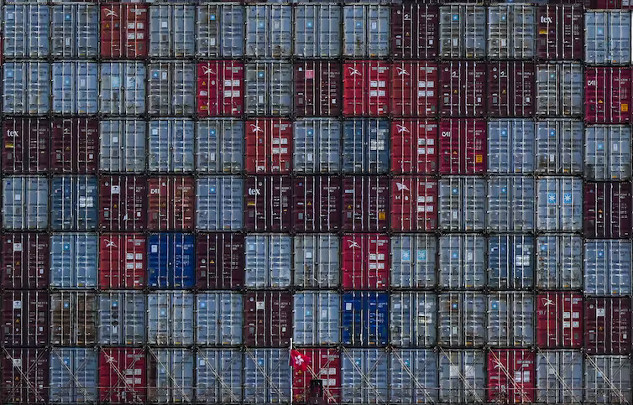 Cargo containers are seen on the Maersk Stockholm ship while docked at port in Vancouver in April 2023. THE CANADIAN PRESS/Darryl Dyck
Cargo containers are seen on the Maersk Stockholm ship while docked at port in Vancouver in April 2023. THE CANADIAN PRESS/Darryl Dyck
The pursuit of greater economic integration through expanded free trade has long been central to the economic policy of most western democracies, including Canada.
Since the implementation of the Canada-United States Free Trade Agreement in 1988, both Liberal and Conservative governments have pursued and continue to pursue more free-trade zones with additional partners in Europe, the Americas and the Pacific Rim.
Recently, however, this general international consensus appears to be unravelling. Trade liberalization is being attacked for promoting income inequality, hollowing out the manufacturing sector, perpetuating underdevelopment in the Global South and increasing the influence of morally dubious states and international corporations.
Economic and social criticisms of free trade, particularly from more left-wing positions, are well-established and longstanding. However, more recent and growing criticisms are now emerging from the right in Europe and the United States.
Conservative shift
These condemnations are effectively disrupting the longstanding ideological orthodoxy that conservatives have maintained when it comes to free trade.
They also reflect not so much an economic critique as they do a preoccupation with social and cultural policy. In fact, these criticisms are tied to many of the broader transformations that are beginning to characterize contemporary conservative politics.
Modern-day conservative enthusiasm for free trade consolidated in the 1980s as a component of a broader shift to neoliberalism that, while felt across the political spectrum, was particularly pronounced for the right.
It drew upon the influence of Friedrich August von Hayek, an Austrian-British economist, and the “Austrian school” of economics to argue that the state should operate like a free market and social and cultural issues should be a matter of individual discretion.
Free trade, therefore, was advocated as part of a greater project aiming for greater economic deregulation and state rollback that proponents argued would be more conducive to individual freedoms.
This consensus, however, was challenged by insurgent radical right-wing parties. Donald Trump was elected president of the United States in 2016 partly on his allegations that America’s free-trade deals were “rigged” by inept domestic negotiators and malicious international entities.
His administration sought to shake up the status quo, pulling out of Trans-Pacific Partnership negotiations, imposing protectionism on steel and aluminum, renegotiating NAFTA and starting a trade war with China.
Class divisions
Since then, a number of American conservatives — such as Republican senators J.D. Vance and Josh Hawley — have developed a more comprehensive form of opposition.
Vance has criticized free trade for empowering a cosmopolitan, socially progressive urban class at the expense of the average American worker. Shut out of wage and labour mobility, he says these working-class Americans are unable to establish a base of financial independence necessary for thriving communities.
These conservatives advocate for protectionism as part of broader state-directed industrial policy to pursue more desirable social ends; a shift to a more robust and interventionist state.
They also want a government that is more morally partial. This means that unlike the prior emphasis on individual freedom or discretion, they challenge the idea that the state can be neutral when it comes to moral, cultural and spiritual values.
Their goals include the revival of domestic manufacturing capacity, individual economic self-determination and strong families, even though these aims might counteract free-market incentives.
Changes in conservative thinking on foreign policy are also relevant. Conservatives are moving away from the prior emphasis on international intervention and interdependence to more of an “America First” idea that the U.S. ought to prioritize the needs of its own citizens than those abroad.
Free trade is also attacked for providing avenues for potentially malicious entities — including rival states like China, international organizations, or powerful corporate interests — to undermine national well-being.
Canada’s conservative history
So far, this shift has had only minimal impact on conservatives in Canada. But recent federal Conservative leaders, while generally supportive of further trade liberalization, have alluded to changing their thinking on trade and foreign policy.
Former Conservative Party of Canada leader Erin O’Toole, for example, broadly referred to a “Canada First” approach that emphasized greater industrial self-sufficiency along with skepticism towards China. Current leader Pierre Poilievre has promised a ban on all overseas oil imports.
Canadian conservatives were once against free trade. Prior to 1988 — when the Canada-U.S. free-trade deal was signed — they had a very different approach to economic policy and many believed encouraging continental integration would fundamentally weaken Canadian sovereignty and national distinctiveness.
In the 1911 election, for example, Robert Borden’s Conservatives campaigned against Liberal Wilfrid Laurier government’s free-trade policy on the claim it would “Americanize” Canada.
John A. Macdonald’s national policy, as pursued by Conservative governments throughout the early 20th century, levied high tariffs on foreign imported goods to help Canadian manufacturing withstand American competition.
In contrast to today’s conservatism, these early Canadian conservatives demonstrated support for a large, interventionist state — and not the free market — to support the expansion of national banking, transportation and infrastructure.
As free trade continues to come under attack by modern-day conservatives, this history may provide signposts to follow international trends — which could have important consequences for Canadian partisan politics.![]()
About The Author
Sam Routley, PhD Student, Political Science, Western University
This article is republished from The Conversation under a Creative Commons license. Read the original article.
Recommended books:
Capital in the Twenty-First Century
by Thomas Piketty. (Translated by Arthur Goldhammer)
 In Capital in the Twenty-First Century, Thomas Piketty analyzes a unique collection of data from twenty countries, ranging as far back as the eighteenth century, to uncover key economic and social patterns. But economic trends are not acts of God. Political action has curbed dangerous inequalities in the past, says Thomas Piketty, and may do so again. A work of extraordinary ambition, originality, and rigor, Capital in the Twenty-First Century reorients our understanding of economic history and confronts us with sobering lessons for today. His findings will transform debate and set the agenda for the next generation of thought about wealth and inequality.
In Capital in the Twenty-First Century, Thomas Piketty analyzes a unique collection of data from twenty countries, ranging as far back as the eighteenth century, to uncover key economic and social patterns. But economic trends are not acts of God. Political action has curbed dangerous inequalities in the past, says Thomas Piketty, and may do so again. A work of extraordinary ambition, originality, and rigor, Capital in the Twenty-First Century reorients our understanding of economic history and confronts us with sobering lessons for today. His findings will transform debate and set the agenda for the next generation of thought about wealth and inequality.
Click here for more info and/or to order this book on Amazon.
Nature's Fortune: How Business and Society Thrive by Investing in Nature
by Mark R. Tercek and Jonathan S. Adams.
 What is nature worth? The answer to this question—which traditionally has been framed in environmental terms—is revolutionizing the way we do business. In Nature’s Fortune, Mark Tercek, CEO of The Nature Conservancy and former investment banker, and science writer Jonathan Adams argue that nature is not only the foundation of human well-being, but also the smartest commercial investment any business or government can make. The forests, floodplains, and oyster reefs often seen simply as raw materials or as obstacles to be cleared in the name of progress are, in fact as important to our future prosperity as technology or law or business innovation. Nature’s Fortune offers an essential guide to the world’s economic—and environmental—well-being.
What is nature worth? The answer to this question—which traditionally has been framed in environmental terms—is revolutionizing the way we do business. In Nature’s Fortune, Mark Tercek, CEO of The Nature Conservancy and former investment banker, and science writer Jonathan Adams argue that nature is not only the foundation of human well-being, but also the smartest commercial investment any business or government can make. The forests, floodplains, and oyster reefs often seen simply as raw materials or as obstacles to be cleared in the name of progress are, in fact as important to our future prosperity as technology or law or business innovation. Nature’s Fortune offers an essential guide to the world’s economic—and environmental—well-being.
Click here for more info and/or to order this book on Amazon.
Beyond Outrage: What has gone wrong with our economy and our democracy, and how to fix it -- by Robert B. Reich
 In this timely book, Robert B. Reich argues that nothing good happens in Washington unless citizens are energized and organized to make sure Washington acts in the public good. The first step is to see the big picture. Beyond Outrage connects the dots, showing why the increasing share of income and wealth going to the top has hobbled jobs and growth for everyone else, undermining our democracy; caused Americans to become increasingly cynical about public life; and turned many Americans against one another. He also explains why the proposals of the “regressive right” are dead wrong and provides a clear roadmap of what must be done instead. Here’s a plan for action for everyone who cares about the future of America.
In this timely book, Robert B. Reich argues that nothing good happens in Washington unless citizens are energized and organized to make sure Washington acts in the public good. The first step is to see the big picture. Beyond Outrage connects the dots, showing why the increasing share of income and wealth going to the top has hobbled jobs and growth for everyone else, undermining our democracy; caused Americans to become increasingly cynical about public life; and turned many Americans against one another. He also explains why the proposals of the “regressive right” are dead wrong and provides a clear roadmap of what must be done instead. Here’s a plan for action for everyone who cares about the future of America.
Click here for more info or to order this book on Amazon.
This Changes Everything: Occupy Wall Street and the 99% Movement
by Sarah van Gelder and staff of YES! Magazine.
 This Changes Everything shows how the Occupy movement is shifting the way people view themselves and the world, the kind of society they believe is possible, and their own involvement in creating a society that works for the 99% rather than just the 1%. Attempts to pigeonhole this decentralized, fast-evolving movement have led to confusion and misperception. In this volume, the editors of YES! Magazine bring together voices from inside and outside the protests to convey the issues, possibilities, and personalities associated with the Occupy Wall Street movement. This book features contributions from Naomi Klein, David Korten, Rebecca Solnit, Ralph Nader, and others, as well as Occupy activists who were there from the beginning.
This Changes Everything shows how the Occupy movement is shifting the way people view themselves and the world, the kind of society they believe is possible, and their own involvement in creating a society that works for the 99% rather than just the 1%. Attempts to pigeonhole this decentralized, fast-evolving movement have led to confusion and misperception. In this volume, the editors of YES! Magazine bring together voices from inside and outside the protests to convey the issues, possibilities, and personalities associated with the Occupy Wall Street movement. This book features contributions from Naomi Klein, David Korten, Rebecca Solnit, Ralph Nader, and others, as well as Occupy activists who were there from the beginning.
Click here for more info and/or to order this book on Amazon.






















